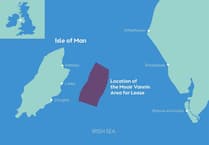The island-based company behind plans to extract natural gas from the Manx seabed claims it could generate £2.8bn in revenues and royalties for the Treasury.
In a statement sent out to Tynwald members, the company said it estimated sales of 660 billion cubic feet of natural gas from the Crogga field off the coast of Maughold over the 19-year life of the field.
Based on average sales price of 80p a therm, this volume would generate gross revenues of £5.3bn.
It said gas sales of this size would generate £2.8bn in royalties and tax revenues to the Manx Treasury over the 19 years and create net income of £2.5bn for Crogga shareholders.
In its statement, Crogga predicted: ‘Annual state income from gas production revenues is estimated to be some £182m, paid into the Manx Treasury as royalties, corporation tax and VAT on gas sales.
‘This very significant new source of state income would make a huge difference to budgets required to fund public services such as health, education and infrastructure.’
Crogga is currently awaiting a decision from the Department of Infrastructure on whether it can vary the conditions of its licence so it can start exploratory drilling.
It hopes to get the licence variation by the end of October and be in a position for the appraisal well to be drilled next year.
It says if it is granted licence approval, it will restart fund-raising for the estimated £32.5m needed to drill and test the appraisal well.
Fund-raising will be open to Manx residents whose subscriptions Crogga anticipates could total £10m, with the balance coming from institutional investors.
‘Crogga would like to see several thousand Manx residents invest in the Crogga project at personally-manageable levels and the board will work to make sure the offering is attractive to all Manx residents,’ the company said in its statement.
It said the development programme would be launched at an estimated cost of £450m, with a target to take a final investment decision in 2027-28 and the first gas piped to a processing plant in Barrow-in-Furness in 2029-30.
Some 12% of production will supply all of the island’s natural gas demand with the remaining 88% sold to the UK and beyond.
The statement was prompted by a Tynwald question to the Chief Minister from Onchan MHK Julie Edge.
Crogga Ltd was awarded a licence in October 2018 to carry out a 3D seismic survey and drill an exploratory well.
This estimated the field contained one trillion cubic feet of natural gas, making it one of the largest deposits in the east Irish Sea.
But the condition of the original licence was that drilling only takes place when a new 3D seismic survey was carried out.
Crogga says it wants to drill the appraisal well first to make sure the field is capable of flowing gas at commercial rates - and then carry out a 3D survey to establish the full extent of the field.
Its chief executive officer Richard Hubbard claimed: ‘The Crogga gas field will play a constructive and important role in the energy transition to net-zero.’
Mr Hubbard, former chief geologist at BP and then director of international operations for Norwegian oil company Statoil, told Media IoM: ‘I’m sure the DoI will allow us to drill - I don’t have any doubts about that.’
Asked whether it was a risk to drill without a 3D seismic survey, he replied: ‘I’ve drilled hundreds if not thousands of wells, you would expect me to know what I’m doing.
‘We need to know about the quality of the reservoir and whether the gas is going to flow at a commercial rate. A 3D seismic survey is not going to answer those questions.
‘We don’t have any doubt that we will hit the gas field. It’s more than a guess, we know where to drill. The risk would be spending money on a 3D survey and then discover it won’t flow.’
‘Mr Hubbard said the island does not currently have any drilling regulations and a regulatory framework needs to be put in place before any drilling can begin.
The Crogga boss said: ‘There is a lot of public interest in this. We are looking to start fund raising and give an opportunity for Manx residents to get a bite-sized chunk of the project.’
Last year, the company returned money raised through public subscription and blamed DoI ‘inaction’ for delays to the project.
Asked whether Crogga could sink the well and then sell its licence on, Mr Hubbard replied: ‘Any licence anywhere in the world can be sold at some time. That’s not unusual. But I’m here to get the field developed and not to try to sell the licence.’
He said the licence would contain provisions that any change of control would require government approval.
-(1).jpg?trim=54,26,0,56&width=752&height=501&crop=752:501)
.jpg?width=209&height=140&crop=209:145,smart&quality=75)


.jpeg?width=209&height=140&crop=209:145,smart&quality=75)